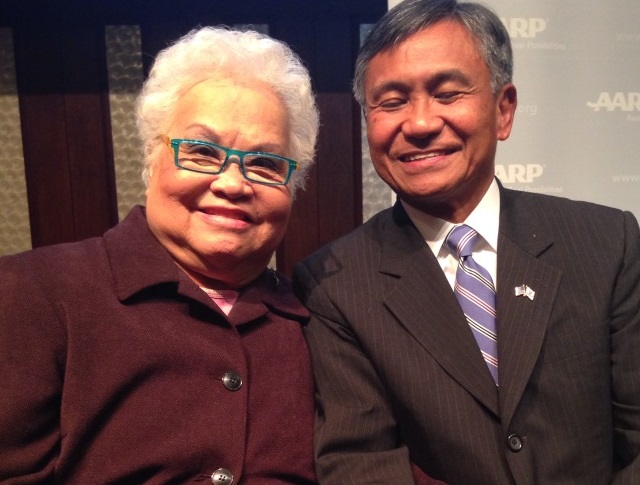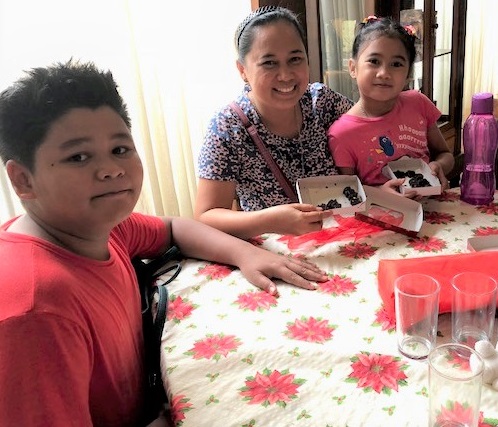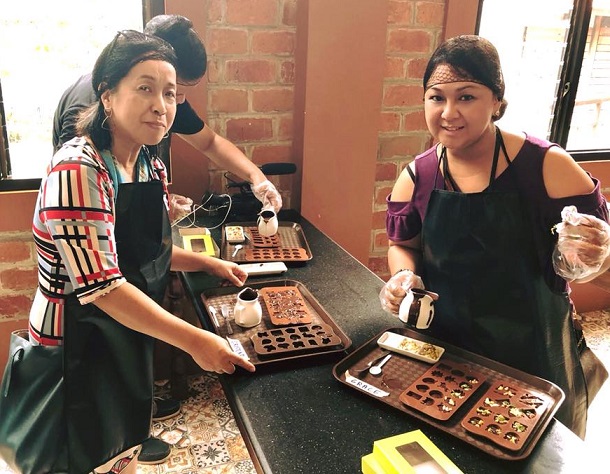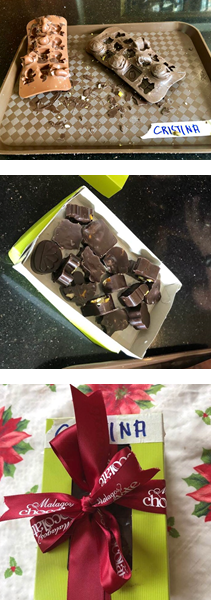Malagos Chocolate: Not quite Willy Wonka but close enough
By Cristina DC PastorDAVAO City — Paul Hubahib, 13, and his sister Andrea, 7, were nibbling chocolates with their mother and cousin when I spotted them. What’s offbeat is they’re munching on chocolates they just made.
At the Malagos Chocolate Laboratory, anyone — especially children like the Hubahib siblings – can make his/her own chocolate candy. Paul put lots of sprinkles and marshmallows in his mold, while Andrea added dried mangoes. “Delicious,” they echoed.
Paul said he’d like to be a chocolatier after creating his own truffles, but his smiling mother, Ivy, knew better, “I think he just wants to eat more chocolates.”
The Malagos Chocolate farm is a massive cacao-growing plantation in this southern city. It has a museum that traces the history of Philippine cacao, a restaurant that serves dishes infused with chocolate (such as Humba with Chocolate), a bar that serves choco drinks, and a laboratory where visitors can concoct their own candy based on their favorite flavors.
Nearby is the Puentespina Farm that grows acres and acres of cacao, a promising commodity in the Philippines.
The Philippines is trying to develop cacao farming as an export industry and source a market for the products. The country is simply not there yet.
“The global demand for cacao has tripled since 1970,” according to the Cacao Industry Development Association of Mindanao (CIDAMI) in its website. The demand just keeps growing because of the health benefits derived from cacao, and its many uses for food, beverage, cosmetics and pharmaceuticals.
The world’s top producers are Ivory Coast and Ghana in Africa; with neighboring Indonesia the world’s third biggest grower and exporter.
What gives optimism to the Philippine government and industry leaders are serious growers like Malagos, owned and operated by the mother-and-son team of Charita and Rex Puentespina, long-time residents of Davao.
While Mindanao accounts for 90 percent of the Philippine’s cacao production, with 80 percent coming from the Davao Region alone, there are enormous challenges. More hectarage, acceptance of new production technology, and length of time for cacao to bear fruits are just some of the hurdles.
Indonesia has a huge head start. Major cocoa trading houses such as Cargill put up to $70 million processing facility in that country to turn cocoa into finished products for the confectionary industry.
“Despite the growing interest in Philippine cacao…much work still needs to be done,” said the CIDAMI trade association.
Malagos is an important player in the cacao industry. While its production is just enough for domestic consumption, its products have gained a reputation in the world. Recently, it was judged “one of the best 50 cacao beans in the world.” The recognition came from the Cocoa Excellence Programme in France. What the 2017 award means, according to Malagos, is that “Philippine beans can compete side by side with the other top producers from cacao-growing countries.”
Members of the Filipino American media from New York were given a tour of the facility. The journalists tried their hand at making their own chocolate. Each was given a mold where they fill their chocolate with different flavors, such as nuts, dried fruits, sprinkles, grated coconut, sea salt, red velvet, etc. The mold is refrigerated for a few minutes. The hardened candies are placed in a box and ribboned, ready to give as gift.
My chocolates stayed with me.
The company, takes pride in its single-sourced products that are ethically farmed.
What they are saying is that all its cacao comes from one verifiable region alone – Davao. Sometimes, cacao beans from one country are blended with the beans of another country, a practice that can produce inconsistent bean quality.
Ethically farmed means there are no children farming the land, cutting off opportunities for abuse.
Right now, said a Malagos official, the country’s production serves only the domestic market. The company makes its own chocolate bars – Unsweetened or Dark — and cacao powder.
Malagos may have a shot in the world market because of the rising popularity of the organic movement.
Customers are paying a premium for farm to table goods that are healthy and ethically produced. From “tree to bar” is the slogan Malagos lives by.
The FilAm magazine was among the news organizations invited to a November 20-28 familiarization tour organized by the Philippine Consulate in New York, the Philippine Department of Tourism, and Philippine Airlines. Davao was the tour’s centerpiece destination.
© The FilAm 2017













